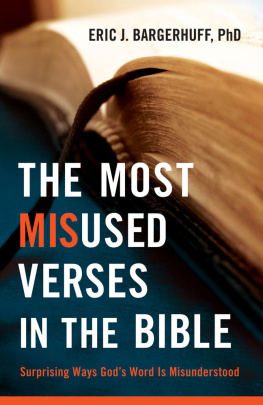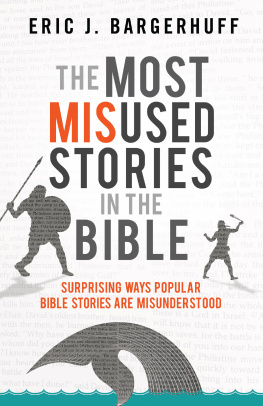With each season of life, people cross your path who you know have been strategically placed there by the L ORD . Two men come to mind as recent sources of encouragement, prayer, and support: Dr. James Gills and Dr. Dennis Cox. Their genuine love for the L ORD and for people has had an impact on so many, and I am privileged to count myself as one of those who have received the blessings that their service to God brings.
Contents
Cover
Title Page
Copyright Page
Dedication
Introduction
1. Abraham and Isaac: The Sacrifice
2. Hate Your Family?
3. An Annoyed Apostle Takes Action
4. Balaam and the Talking Donkey
5. Emasculate Themselves!
6. Justification by Faith Alone?...
7. Lead Us Not into Temptation
8. Foreskins and Foolishness
9. The Finger on the Wall
10. Jesus and an Unfortunate Fig Tree
11. A Message from God
12. An Ear Is Cut Off
13. Jeremiahs Linen Underwear
14. The Nephilim: Who Were They?
15. No One Knows the Day or the Hour
16. A Nose Full of Quail
17. Solomons Many Wives
19. Herod Eaten by Worms
20. Send the Choir into Battle First
21. Death at Communion
22. A Youth Group Is Killed by Bears
23. Not Peace but Division
24. Absaloms Head Stuck in a Tree
25. The Sun and Moon Stand Still
26. Neither Jew nor Gentile... Male nor Female
27. Ananias and Sapphira
28. Handling Snakes and Drinking Poison
29. The Battle for Moses Body
30. Angel Armies
31. Bodily Discharges
32. Resurrections at Christs Death
33. Dismemberment of a Concubine
34. Head Coverings
35. Eat My Flesh and Drink My Blood
36. Saul, a Medium-Spiritist, and the Spirit of Samuel
37. Sweat Like Drops of Blood
38. A Footrace to the Tomb
39. The Romantic Wording in Song of Songs
40. Child Sacrifice
Conclusion
Notes
About the Author
Back Ad
Back Cover
Introduction
P erhaps the most shocking verse in the Bible is Job 1:8, where the L ORD says to Satan, Have you considered my servant Job?essentially offering up a godly man for a season of unprecedented testing and anguish. The story is an astounding account of a man who is faithfully walking with the L ORD , and then sees his livestock, servants, even his children, perish in the blink of an eye. Not only that, but Jobs health takes a turn for the worse, his wife opposes him, and his closest friends show up with rampant speculations and bad advice. Only toward the end of his life does the situation drastically change.
Jobs story is the antidote to the prosperity gospel of our time, the belief that if you simply have enough faith, then physical, material, or financial blessings will undoubtedly be Gods will for you. Yet the fact that the L ORD allowed Satan to inflict devastating blows to Jobs life (but put limits on what he could do) demonstrates to us that God is sovereign over all of life, both good times and bad, and that material blessings of all kinds are not a measure of ones faith. God is worthy of being worshiped and trusted even if what happens to us remains a mystery.
I, for one, am so thankful this story is in the Bible. I believe it is there to teach us many lessons, one being that things happen in the heavenly realms that we are not always privy to when we go through seasons of suffering. Another lesson is that sometimes our suffering is directly related to our lifestyle, and other times it is not. Either way, in Jobs story we get a needed perspective of the heavenly realms.
Through the course of this book, we will look at some of the most perplexing verses and stories in the Bible. We are limited in what we can cover space-wise, so I have done my best to present a healthy cross section of passagesthe strange, the disgusting, the controversial, the mysterious, and the flat-out hard to believeall for the purpose of asking, Why is that in the Bible?
Some of these stories and verses are difficult to interpret, so I include a concise summary and simple interpretation of each, using a sound, scholarly interpretive approach to ancient texts. I believe there is only one proper interpretation of the Bible (in context), but several applications can be borne from the text. My method of interpretation is the literal, grammatical, historical interpretation, where the goal is to discover the original authors intent and to understand the context in which it was originally spoken, written, and heard. We should avoid allegorizing or spiritualizing texts in a way that is foreign to the original authors intent. This is how many have misused, misinterpreted, and misapplied this ancient document.
I believe the Bible is fully inspired by God and is without error in the original manuscripts. When all the facts are fully known, the Bible will be shown to be true in all that it affirms. But this does not mean it is always easy to understand. Faith, the indwelling Holy Spirit, and the faith community (the church) serve as aids to help us grasp its truths. This is called the clarity of Scripture. It was meant to be read and understood by Gods people. God does not intend to play celestial hide-and-seek with his Word. He desires and delights in revealing himself and his will to us.
Still, there are hard things in the Bible to understand and grasp. For example, why are some stories so graphic? How do we make sense of the evil it portrays? What do we make of events that are seemingly impossible or miraculous? Why would God include talking donkeys, bizarre ways of death, or lead us into a glimpse of the supernatural world that we do not normally see?
No wonder the Bible is the greatest-selling book of all time. Not only is it inspired literature (revealed to us from God), it is full of action, mystery, romance, war, drama, and just about everything else that makes for a good movie. But this is no movie. It is all real. It is our story, our life, our God, and our past, present, and future all wrapped into one.













